英语学术论文写作技巧academic_writing_skills(全英文版)
Academic Writing 论文写作
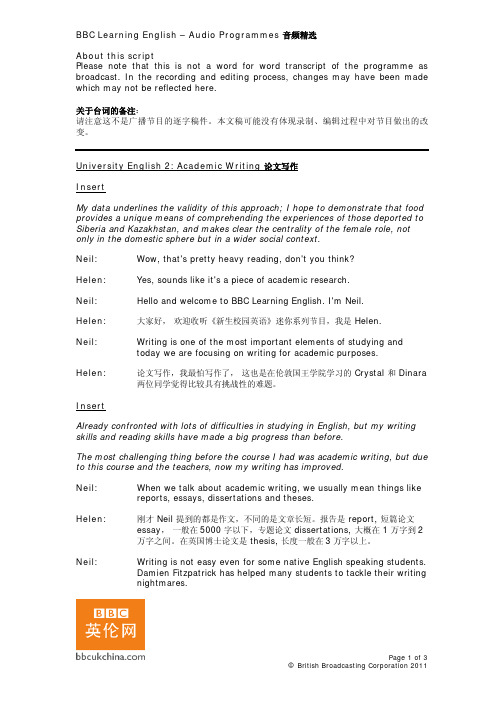
BBC Learning English – Audio Programmes 音频精选About this scriptPlease note that this is not a word for word transcript of the programme as broadcast. In the recording and editing process, changes may have been made which may not be reflected here.关于台词的备注:请注意这不是广播节目的逐字稿件。
本文稿可能没有体现录制、编辑过程中对节目做出的改变。
University English 2: Academic Writing 论文写作InsertMy data underlines the validity of this approach; I hope to demonstrate that food provides a unique means of comprehending the experiences of those deported to Siberia and Kazakhstan, and makes clear the centrality of the female role, not only in the domestic sphere but in a wider social context.Neil:Wow, that's pretty heavy reading, don't you think?Helen:Yes, sounds like it's a piece of academic research.Neil:H ello and welcome to BBC Learning English. I'm Neil.Helen:大家好,欢迎收听《新生校园英语》迷你系列节目,我是 Helen.Neil:Writing is one of the most important elements of studying and today we are focusing on writing for academic purposes.Helen:论文写作,我最怕写作了,这也是在伦敦国王学院学习的 Crystal 和 Dinara 两位同学觉得比较具有挑战性的难题。
培养写作能力的方法的英语作文

培养写作能力的方法的英语作文英文回答:To develop writing skills, there are several methods that can be effective. One way is to read extensively in both English and Chinese. Reading exposes us to different writing styles, vocabulary, and sentence structures, which can enhance our own writing abilities. By reading a variety of materials such as books, newspapers, and articles, we can gain a deeper understanding of how to effectively express our thoughts in writing.Another method is to practice writing regularly. Set aside dedicated time each day to write, even if it's just for a few minutes. This can help improve our writing fluency and creativity. We can start with simple exercises like keeping a journal or writing short stories. Additionally, seeking feedback from others, such as teachers or peers, can provide valuable insights and suggestions for improvement.Furthermore, studying grammar and vocabulary isessential for developing strong writing skills. Understanding the rules of grammar and expanding our vocabulary will enable us to construct more coherent and accurate sentences. There are various resources available, such as textbooks, online courses, and language exchange programs, that can help us enhance our language proficiency.Moreover, it is beneficial to analyze and learn fromwell-written essays or articles. By examining the structure, organization, and language used in these pieces, we cangain a better understanding of effective writing techniques. We can also learn from the mistakes made in poorly written texts, as they can provide valuable lessons on what toavoid in our own writing.In addition, practicing different types of writing,such as argumentative essays, descriptive writing, and narrative storytelling, can help us develop versatility in our writing skills. Each type requires a different approach and style, which can further enhance our overall writingabilities.Lastly, it is important to revise and edit our writing. After completing a draft, take the time to review and make necessary changes. This includes checking for grammar and spelling errors, improving sentence structure and clarity, and ensuring the overall coherence and flow of the piece.By revising our work, we can refine our writing and make it more impactful.中文回答:培养写作能力的方法有很多。
Writing skills(本学期写作范文参考)

以下是我们本学期学过的writing skills,大家也都根据要求做了相应的写作练习。
在此做了一个总结,并附上范文,希望对大家考试的写作有所帮助。
Writing Skill OneHow to Develop an English Paragraph in Cause and Effect PatternA cause and effect paragraph generally follows a basic format. That is, it begins with a topic sentence and this sentence is followed by specific supporting details. For example, if the topic sentence introduces an effect, the supporting sentences all describe causes, and vice versaWords and Phrases That May Be Used in a Cause and Effect PragraphHere are some common words and phrases that can be used in a cause and effect paragraph:since as a result because of + noun phrasebecause therefore due to + noun phraseconsequently for this reason so(我们当时讲了Cause and Effect Pattern,写作练习是一篇有关personality的文章。
这里给出一篇其他主题的范文,主要看看如何运用这种写作模式。
)Write a Paragraph as RequiredDirections: Please write a paragraph on the topic Why Is Sb. in Good Health?Your paragraph should be written in cause and effect pattern, including a topicsentence, developing sentences and a concluding sentence.Sample WritingThere are several possible reasons why my father is in good health, even though he is over eighty years of age. For one thing, he is now in good condition because he has stopped smoking cigarettes. He quit smoking cigarettes because whenever he climbed stairs he would invariably stop several times and cough loudly. For another, his good health is also due to his cutting down on the wrong kinds of foods. For example, he used to eat fatty red meat and deep-fried dishes several times a week, but nowadays he seldom does so. What’s more, he is also in good shape as a result of his devotion to exercise. He swims three times a week at the local natatorium, and on sunny days he prefers to walk home rather than take the bus. Thus, my father is inbetter shape than some of his children are!Writing Skill TwoHow to Develop an English Paragraph by ListingA paragraph can be developed by listing, which, through a list of reasons, facts, ideas or even possibilities, illustrates or supports a general statement of a paragraph. The points should be listed according to the sequence of time and space and/or the degree of importance of the ideas.The transitional words frequently used in listing are: for one thing, for another, finally, besides, moreover, one another, still another, first, second, also, etc.Write a Paragraph as RequiredDirections: Write a paragraph with the title The Unbright Side of City Life, which should be developed by listing.Sample WritingIn the eyes of many people, city life is attractive with all its advantages and convenience, yet they don't see the other side of the picture. First, with the expansion of the city, housing has become a serious problem for city people. Then, there is the problem of pollution: harmful gases from vehicles and poisonous water from factories pollute our surroundings; noise continually disturbs your peace and rest and drives you mad. Thirdly, modern city life puts a high pressure upon people; you have to hurry to and from work; you have to dodge (闪躲) in so as to avoid bumping into the flood of people, bicycles, cars, buses…; all day long you are under great stress. Fourthly, big cities also cause some social problems, of which high crime rate is the most serious one. People are justifiably in fear of becoming victims of burglary, robbery, murder and other crimes at any time. People living a city life have to thus find some ways to cope with all these problems.Writing Skill ThreeHow to Develop a Paragraph by Comparison and Contrast Developing a paragraph by comparison and/or contrast involves comparing and contrasting two subjects. A comparison shows how two things are alike. A contrast shows how two things are different.A comparison/contrast paragraph usually follows one of these two patterns: the subject-by-subject pattern or the point-by-point pattern.In the subject-by-subject pattern, the writer discusses the various aspects of one item before going to the other. While in the point-by-point pattern, the writer discusses both items under each of the various aspects compared/contrasted.Write a Paragraph as RequiredDirections: Write a comparison paragraph based on the topic −Winners and Losers;this paragraph will be organized in the subject-by-subject pattern. Sample WritingIt is easy to be a winner. A winner can show his joy publicly. He can laugh, sing and dance to celebrate his victory. People love to be with winners. Winners are never lonely. Unlike winners, however, losers are the lonely ones of the world. It is difficult to face defeat with dignity. Losers cannot show their disappointment publicly. They cannot cry or grieve about their defeat. They may suffer privately, but they must be composed in public. They have nothing to celebrate and no one to share their sadness. Writing Skill FourHow to Develop a Paragraph in Problem-Solution Pattern The problem-solution pattern(解题法)is one of the most common patterns we adopt to develop a paragraph. It is especially useful in persuasive argumentations where you want to convince the readers that a problem exists and that your solution would solve, or at least alleviate, the problem. A paragraph in problem-solution pattern often starts by identifying a particular situation and then poses the problem (or problems)(提出问题). Afterwards it proposes one or more solutions to cope with the problem (or problems)(解决问题). In some cases, there may be an evaluation or comment on the solution (or solutions)(评价解决问题的方法)in the end of the paragraph.Write a Paragraph as RequiredDirections: Please choose a problem (or problems) for your own writing. Develop ashort paragraph with the problem-solution pattern. The following are afew examples of the problems you might consider.❖great pressure in life❖global pollution❖endangered species❖natural disasters❖misunderstanding between you and your parents / friends❖problems with the canteenSample WritingGreat Pressure in LifeAt present, more and more people are under great pressure in China. Heavy work demands and intense competition have piled enormous pressure on the individuals at different ages from all walks of life. (Problem)To cope with the huge pressure properly and effectively, people can begin with selecting a proper way for relaxation, such as doing some sports, listening to their favorite music, or pampering(纵容)themselves with a long warm bath. (Solution 1)Second, the over-high expectations leading to the strong strain must be lowered. (Solution 2)Third, people can make some new friends or chat with close friends so as to reduce the stress. (Solution 3) All of these can help people alleviate pressure in life to some extent. (Evaluation)。
学术英语写作课件Academicwriting概要
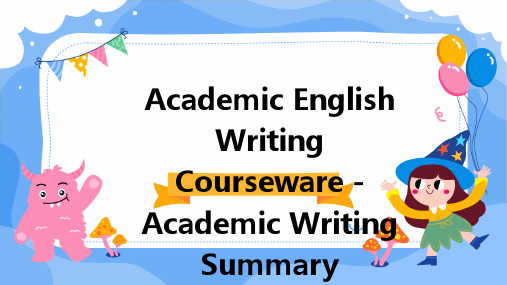
目录
• Writing Techniques for Academic Papers • Publication and evaluation of academic
papers
01
Introduction to Academic English
Writing
The Definition of Academic English Writing
VS
Method
Critical evaluation of the strengths and weaknesses of past research, and how the current study builds upon or challenges existing knowledge.
Research Method
对于学生和研究者来说,良好的学术 英语写作能力是获得学位、发表论文 和提升职业发展的关键因素。
Norms and Requirements for Academic English Writing
01
学术英语写作应遵循准确、清晰、简洁和规范的语言表达原则。
02
文章结构应包括引言、文献综述、方法、结果和结论等部分,
Academic English Writing
Courseware Academic Writing
Summary
目录
• Introduction to Academic English Writing • The structure and organization of academic
papers • The Language Characteristics of Academic
academic writing 学术英语写作

学术英语写作是学术界中常用的书面语言,主要用于发表研究论文、学术论文、会议论文等。
学术英语写作需要遵循一定的规范和格式,包括文献引用、语言表达、逻辑结构等方面。
学术英语写作要求清晰、准确、严谨地表达学术观点和研究成果,同时要遵守学术道德和规范,避免抄袭、剽窃等行为。
学术英语写作需要具备一定的学术素养和英语语言能力。
作者需要具备相关领域的学术背景和专业知识,能够准确理解和阐述研究问题、实验结果和结论等。
同时,作者需要具备较高的英语语言水平,能够清晰、准确地表达学术观点和研究成果,并能够正确使用相关的学术术语和表达方式。
学术英语写作需要注重逻辑性和条理性。
在写作过程中,作者需要遵循一定的逻辑结构和表达方式,确保文章思路清晰、条理分明。
同时,作者需要注重推理和论证的严密性,确保结论和观点的正确性和可靠性。
总之,学术英语写作是学术界中非常重要的技能之一,对于学术研究和成果的传播都具有重要意义。
作者需要不断提高自己的学术素养和英语语言能力,掌握学术英语写作的规范和技巧,才能写出高质量的学术论文和研究成果。
英语学术文章写作技巧
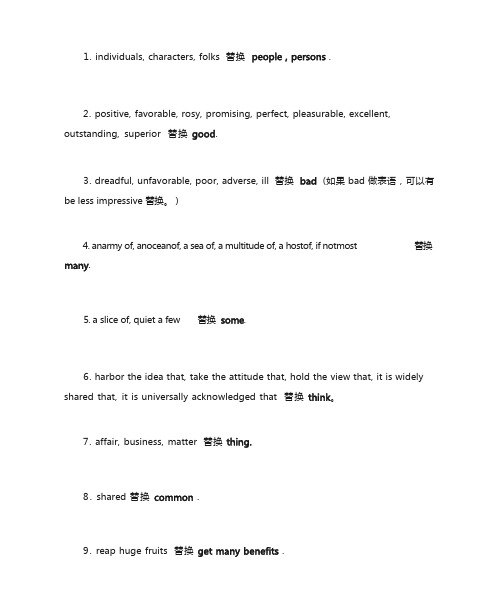
1. individuals, characters, folks 替换2. positive, favorable, rosy, promising, perfect, pleasurable, excellent, outstanding, superior 替换3. dreadful, unfavorable, poor, adverse, ill 替换如果 bad 做表语,可以有be less impressive 替换。
)4. anarmy of, anoceanof, a sea of, a multitude of, a hostof, if notmost 替换5. a slice of, quiet a few 替换6. harbor the idea that, take the attitude that, hold the view that, it is widely shared that, it is universally acknowledged that 替换7. affair, business, matter 替换8. shared 替换9. reap huge fruits 替换10. for my part ,from my own perspective 替换11. Increasing(ly), growing 替换注意没有 growingly 这种形式。
所以当修饰名词时用 increasing/growing 修饰形容词,副词用 increasingly. )12. little if anything 或 little or nothing 替换13. beneficial, rewarding 替换14. shopper, client, consumer, purchaser 替换15. overwhelmingly, exceedingly, extremely, intensely 替换16. hardly necessary, hardly ine vitable…替换17. indispensable 替换18. sth appeals to sb, sth exerts a tremendous fascination on sb 替换替换20. facet, demension, sphere 替换21. be indicative of, be suggestive of, be fearful of 替换22. give rise to, lead to, result in, trigger 替换23. There are several reasons behind sth24. desire 替换25. pour attention into 替换26. bear in mind that 替换27. enjoy, possess 替换注意 process 是过程的意思)。
东南大学学术论文写作-单元1Unit1

B. Formal Grammar and Style
III. Language Focus
Sentence structures in academic writing are more complex. Academic writing should NOT be complicated. It should be relatively easy to follow, written in a clear, direct style. Recommendations for maintaining a formal academic writing style. Avoid contractions. Export figures won't improve until the economy is stronger. Export figures will not improve until the economy is stronger.
Academic writing often discusses difficult, challenging ideas which can only be expressed with particular grammar and language.
Academic writing should be clear, concise and structured.
Learning Objectives
How is academic writing different from other forms of writing? What is your purpose of initiating an academic research? What are the key characteristics of academic writing?
英语学术论文写作技巧academic writing skills(全英文版)共38页文档
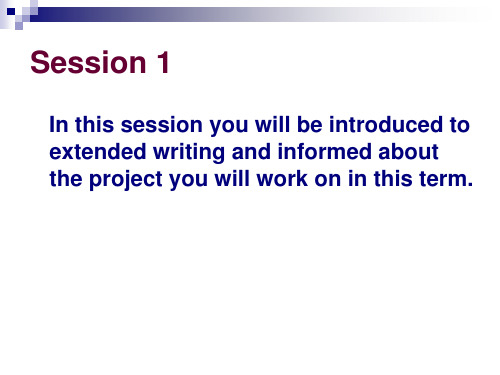
protection/copyright protection” Discuss the following with a partner: Look at the project title above and highlight the key words/phrases. How is the title framed (e.g. statement/question/heading)? What does the title ask you to do?
- gathering information from various sources;
- organizing this information so that it appropriately answers the needs of the task that the writer has to complete;
The reasons why students carry out extended academic writing activities may s their ideas; to provide evidence to support their ideas; to dispute or support existing theories; to display knowledge.
Internet. e) Write down the details of your sources. f) Decide if you need to do more reading. g) Write the contents page, bibliography, title page and abstract. h) Arrange a tutorial with your tutor. i) Do some reading. j) Decide on a topic. k) Write the first complete draft. l) Highlight/take notes of relevant information. m) Plan the contents in detail. n) Work on establishing a clear focus. o) Make a rough outline plan of your ideas. p) Check that sources are available/accessible.
英文学术论文写作_研究生教学(全英文)

English for Academic Paper Writing & Publication
Unit 2 Title, author,affiliation & keywords
2. Author/affiliation General functions bearing author’s responsibility; facilitating retrieval & correspondence; heightening celebrity Linguistic features spelling names (HU Jingtao, Hu Jingtao, LI Ju, Li Ju); giving correct information about affiliation (no abbreviations; adequate postal address; zip code)
English for Academic Paper Writing & Publication
Unit 2 Title, author, affiliation & keywords
Abstract: Equality of educational opportunity is the key of educational equality and the reflection of social equality, covering equality opportunities of enrollment educational process and educational result. At present in our country, inequality of educational opportunequality of educational opportunity from the sociological perspectives turns out to have important theoretical significance and practical value to propel positive development of education and realize human's comprehensive development and social equality.
研究生学术论文英文写作技巧与评估

研究生学术论文英文写作技巧与评估Graduate Academic Paper Writing Skills and EvaluationIntroductionWriting academic papers in English is a significant aspect of graduate studies. This requires mastering certain skills and adhering to specific guidelines to produce high-quality research papers. In this article, we will discuss essential techniques for writing academic papers in English at the graduate level, as well as methods for evaluating the quality of these papers.I. Understanding the RequirementsBefore embarking on writing an academic paper, it is crucial to carefully read and comprehend the requirements provided by your university or academic institution. The requirements typically outline the formatting style, word limit, citation guidelines, and specific sections to include in your paper (e.g., introduction, literature review, methodology, results, and conclusion). Adhering to these requirements ensures that your paper meets the necessary standards.II. Conducting Thorough ResearchA fundamental aspect of academic paper writing is conducting thorough research on the chosen topic. This includes consulting reputable sources such as academic journals, books, and scholarly databases. It is essential to critically analyze and synthesize information from multiple sources to provide a comprehensive and well-supported argument in your paper.Addressing both primary and secondary sources adds credibility to your research.III. Developing a Clear StructureA well-structured paper enhances readability and helps convey your ideas effectively. It is advisable to divide your paper into sections, each with a clear objective. Typically, an academic paper consists of an introduction, literature review, methodology, results, discussion, and conclusion. Each section should flow logically and smoothly, enabling readers to follow your thought process. Utilize appropriate headings and subheadings to provide clarity and coherence throughout your paper.IV. Writing Style and LanguageWhen writing an academic paper, using a formal and concise writing style is crucial. Academic writing demands clarity and precision in expressing ideas and arguments. Avoid using excessive jargon and technical terms that may confuse your readers. Instead, aim for clear and straightforward language that allows your arguments to be easily understood. Paying attention to grammar, punctuation, and spelling is equally important to maintain the professionalism of your paper.V. Citing and ReferencingProper citation and referencing are essential in academic writing to acknowledge the work of other researchers and avoid plagiarism. Follow the designated citation style (e.g., APA, MLA, or Chicago) recommended by your institution. Ensure that all sources referenced within your paper are cited correctly in the chosen citation style. Failing to give credit to theoriginal authors can result in severe consequences and damage your academic integrity.VI. Peer Review and RevisionBefore submitting your paper, it is advisable to have it peer-reviewed by colleagues or professors. Peer review provides valuable feedback on the clarity, structure, and coherence of your paper. Consider and incorporate the suggestions and improvements given by reviewers into your final draft. Additionally, revise your paper multiple times to eliminate grammatical errors, improve sentence structure, and enhance the overall flow and organization.Evaluation of Academic PapersTo evaluate the quality of graduate academic papers, multiple factors are considered. These include:1. Originality and Contribution: The extent to which the paper presents new insights, discoveries, or theories in the chosen field of study.2. Clarity and Coherence: The overall effectiveness of the paper in presenting ideas, arguments, and evidence in a clear and concise manner.3. Research Depth: The thoroughness and comprehensiveness of the literature review and the depth of research conducted.4. Methodology: The appropriateness and soundness of the research design and methodology employed.5. Analytical Skills: The ability to critically analyze and interpret research findings and draw meaningful conclusions.6. Citation and Referencing: The accuracy and consistency of citation and referencing throughout the paper.7. Writing Style and Language: The clarity, precision, and professionalism of the writing style and language used in the paper.8. Organization and Structure: The logical flow and organization of the paper, including the coherence of ideas and the effectiveness of section divisions.ConclusionWriting academic papers in English as a graduate student requires mastering specific skills and adhering to established guidelines. By understanding the requirements, conducting thorough research, developing a clear structure, utilizing appropriate writing style and language, and properly citing and referencing sources, students can produce high-quality papers. Evaluating these papers involves considering factors such as originality, clarity, research depth, methodology, analytical skills, citation and referencing, writing style and language, and organization. By continuously honing these skills and receiving feedback, graduate students can enhance their academic paper writing abilities.。
Unit 2 Academic Writing【研究生专业英语】
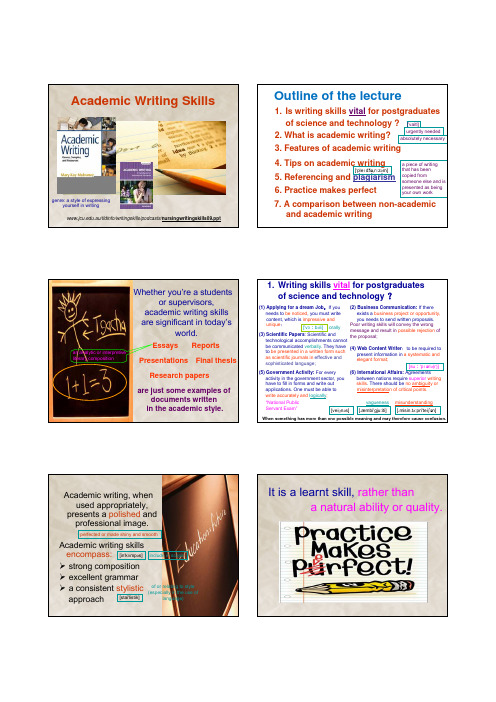
Academic Writing Skills.au/tldinfo/writingskills/podcasts/nursingwritingskills09.pptgenre: a style of expressingyourself in writingWhether you’re a studentsor supervisors, academic writing skills are significant in today’sworld.EssaysReports PresentationsResearch papers Final thesisare just some examples ofdocuments written in the academic style.an analytic or interpretive literary compositionAcademic writing, when used appropriately, presents a polished and professional image.Academic writing skillsencompass:¾strong composition ¾excellent grammar¾a consistent stylistic approach[in'k ʌmp əs]include in scope [stai'listik]perfected or made shiny and smoothof or relating to style(especially in the use oflanguage) It is a learnt skill, rather thana natural ability or quality.2. What is academic writing?Academic writing refers to a particular styleof expression in academia.3. Features of Academic WritingAcademic writing in English is linear, which means it has onecentral point or theme with every part contributing to the main lineof argument, without digressions or repetitions . [dai'gre ʃən]a message that departs from the main subject[.repi'ti ʃən]ComplexityWritten language is relatively more complex than spoken language.FormalityAcademic writing is relativelyformal. In general this means that you should avoid colloquial words.PrecisionIn academic writing, facts andfigures are given precisely .ObjectivityWritten language is in generalobjective. Academic writing tends to use nouns (and adjectives), rather than verbs (and adverbs).Exp’licitnessAcademic writing is explicit about the relationships in the text.AccuracyAcademic writing uses vocabulary accurately.HedgingIn academic writing, it is necessary to make decisions about your stance on a particular subject.ResponsibilityIn academic writing you must be responsible for, and must be able to provide evidence and justification for, any claims you make.[k ə’l əʊkwi:əl] [pri’si ʒən] [pr ɪ’sa ɪsli] [,ɔbd ʒek’tiv əti] Attitude or feeling Characteristics includeEmploying the formal academic style, avoiding jargon , slang , andabbreviations a way of regarding situationsor topics etc.:position , view[p ə'spektiv]Synonyms [t əun]a characteristic language of a particular groupinformal language consisting of words and expressionsA formal toneUse of the third-person rather than first-person perspective Clear focus on the issue or topic rather than the author’s opinion Precise word choiceinvestigate conduct examine verify demonstrate eliminateCharacteristics of informal writingz the use ofcolloquialisms andjargonz writing in the first person viewz making “I”statements, making direct personal statements, andimprecise word choices.[k ə’l əukwi əliz(ə)m] slang, dialect[.impri'sais]characteristic of informal spokenlanguage or conversationJust as you probably would wear shorts and flip-flops to a wedding, there’s a time and a place for informalwriting . Informal writing is fine for diary entries, blogs, personal writing, letters or emails to close friends.The most informal writingimaginable is:z the text message, full of abbreviations such as “R U here ?”toconvey quick questions and responses. z In comparison, the most formal writing of all can be found in legal documents .[i'mæd ʒin əbl][‘pai ərit]someone who uses another person's work or ideas as if they were his own‘plagiarism Writers working on papersfor school, college application essays , scientific papers,research papers , international conference presentations , and business proposals generally employ a more formal style akin to donning a suit or dressto attend a wedding.[ə'kin]similar or related in quality or characterput clothing on one's body['d ɔni ŋ]4. Tips on academic writing ExamplesInformal writing :I think he ’s a loser .Formal writing :Macbeth’s horrific choices cause him to lose everything he holds dear :children, wife, friends, crown and king.frightening colon [ 'k əʊl ən]?The first statement is informal. The writer speaks in the first person , using the word “I”, and states an opinion . The slang term “loser ”, is used, which is inappropriate in a formal context. They also uses the contraction “he’s ”. If this were in the middle of a paragraph, it may be easier to understand towhom the author is referring.Taken as a simple statement, however, it’simpossible to know whether the writer thinks his best friend, hisdog, or a rock star is a loser !The second example uses an academic, formal style . Written in the third-person view , the sentence omits references to the writer and focuses on the issue. Strong, specific adjectives like “horrific ”convey the author’s view clearly without resorting to slang . The use of the colon creates a strong, formal feeling when properly usedhere to introduce a list .[ 'k əʊl ən]Where’s the resource ??•Library•On-line•Data bases (turn on remote access)•Lectures•Text books•Tutorials•News•Newspapers•Everywhere!!!5. Referencing and plagiarismMost plagiarism is acci’dental; either the result of not understanding what actually amounts to plagiarism, or of being poorly organized, so that we use the ideas of others without realizing that’s what we have done.Whenever the author has given somethingdistinctive to the information or its organization,cite the source.Anything that is common knowledge you need not cite: in other words, anything that is not distinctiveof a particular author.distinguishing /skills4study/studyskills/reading/referencing.aspunintendedWhat is plagiarism?Copying ofpassages/text/work/ideas/data without aproperacknowledgement ofthe author. Thisincludes otherstudents’work.['pleidʒiərizəm]Getting started•Find your time•Find your space•Discipline, self & others•Brain storming, clustering, mind mapping•Free writingtry to solve a problemby thinking intensely about it6. Practice makes perfectIntroduction•What is the question?•Global view from the broad to the narrow •Introduce the :•Who•What•When •Where •Why •How 5W+HThe topic•Why is it being asked?•Is it multi layered?•Does it invite a largely factual response?•Is it looking for a particular stance such asargue or cri’tique?[stæns] positionposturereview, assessment, commentLiterature•Is it current?•Is the author a credible source?•Is the subject relevant?•Clustering•References/endnoteBeginning•A quotation –is it relevant•A question•An opinion•An interesting fact•An irony or paradox•An a’nalogy•And anecdote['ænikdəut]story, narrative(especially a biographical one)[‘aiərəni[‘pærədɔks][ə’nælədʒi](logic) a statementthat contradicts itselfirony witty language富于机智的,诙谐的similarityBodyYour paragraphs should flow naturally into oneanother andconnections shouldbe made.Paragraphs•7-8 sentences•Each should be topic specific, preferably with an introductory sentence•Each sentence states the content/context and then some supporting example which is where the references come in.•The last sentence concludes the paragraph and forwards to the next.Transitional words•Joining words»Also, and, again, etc•Comparing words»Also, in comparison•Contracting words»Although, but, conversely, despite, even though, however•Positioning words»Above, adjacent to, below•Situation words»Before, briefly, consequently, finally, first[træn'zi ʃən əl]Conclusions•Don’t introduce anything new •Draw in the introduction •Demonstrate a conclusion•Give the essay a sense of completeness •Leave a final impression7. A comparison between non-academicand academic writingRevision1.Is writing skills vital for students ofscience and technology ?2. What is academic writing?3. Features of Academic Writing4. Tips on academic writing5. Referencing and plagiarism6. Practice makes perfect7. A comparison between non-academicand academic writing。
如何写出精彩的英文论文
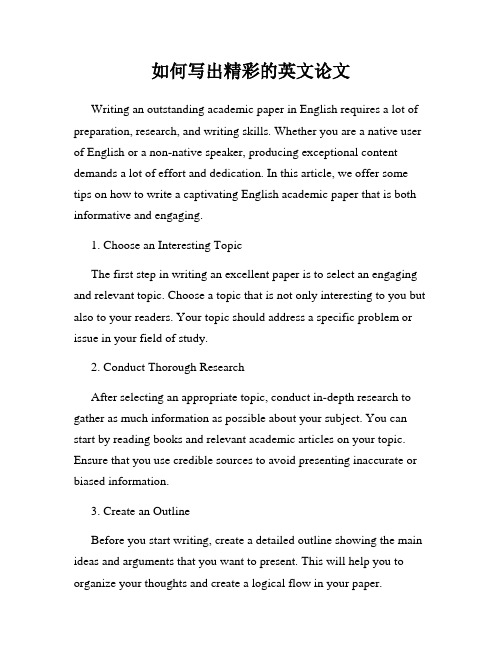
如何写出精彩的英文论文Writing an outstanding academic paper in English requires a lot of preparation, research, and writing skills. Whether you are a native user of English or a non-native speaker, producing exceptional content demands a lot of effort and dedication. In this article, we offer some tips on how to write a captivating English academic paper that is both informative and engaging.1. Choose an Interesting TopicThe first step in writing an excellent paper is to select an engaging and relevant topic. Choose a topic that is not only interesting to you but also to your readers. Your topic should address a specific problem or issue in your field of study.2. Conduct Thorough ResearchAfter selecting an appropriate topic, conduct in-depth research to gather as much information as possible about your subject. You can start by reading books and relevant academic articles on your topic. Ensure that you use credible sources to avoid presenting inaccurate or biased information.3. Create an OutlineBefore you start writing, create a detailed outline showing the main ideas and arguments that you want to present. This will help you to organize your thoughts and create a logical flow in your paper.4. Write a Compelling IntroductionThe introduction is the first part of your paper that your readers will see. A well-written introduction should grab the readers' attention and give them an idea of what to expect in the rest of the paper. It should also provide a brief background of your topic and thesis statement.5. Develop a Strong Thesis StatementYour thesis statement is the central argument of your paper. It should be clear, concise, and specific. Ensure that it effectively communicates your position on the topic and provides a roadmap for your paper.6. Use Clear and Concise LanguageTo write an excellent paper, use clear and concise language that is easy to understand. Avoid using jargon, complex sentence structures, or unfamiliar words that can confuse your readers.7. Provide Supporting EvidenceTo convince your readers of your argument, you need to provide supporting evidence. Use examples, statistics, and empirical evidence to strengthen your position. Ensure that you cite your sources properly to give credit to the original authors.8. Present Counterarguments and RebuttalAcknowledge opposing views and provide a rebuttal to strengthen your argument. This shows that you have considered alternative perspectives and that your argument is well-rounded.9. Conclude with a Call to ActionEnd your paper with a compelling conclusion that summarizes your main points and provides a call to action. Your conclusion should leave a lasting impression on your readers and motivate them to take action.In conclusion, writing an outstanding English academic paper requires a lot of effort and dedication. By following the tips above, you can create a compelling paper that is both informative and engaging. Remember to choose an interesting topic, conduct thorough research, create an outline, write a compelling introduction, develop a strong thesis statement, use clear and concise language, provide supporting evidence, present counterarguments and rebuttal, and conclude with a call to action.。
英语学术论文写作技巧academic writing skills(全英文版)
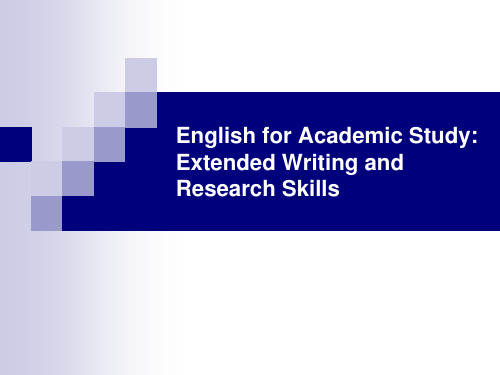
Extended writing at university: Why do students write?
The reasons why students carry out extended academic writing activities may include: to develop and express their ideas; to provide evidence to support their ideas; to dispute or support existing theories; to display knowledge.
a) Read the first draft. b) Edit the draft --- decide objectively whether your ideas have been expressed clearly. c) Think of a working title for the project. d) Search for relevant journals/books/information in the library and on the Internet. e) Write down the details of your sources. f) Decide if you need to do more reading. g) Write the contents page, bibliography, title page and abstract. h) Arrange a tutorial with your tutor. i) Do some reading. j) Decide on a topic. k) Write the first complete draft. l) Highlight/take notes of relevant information. m) Plan the contents in detail. n) Work on establishing a clear focus. o) Make a rough outline plan of your ideas. p) Check that sources are available/accessible.
如何提高写作能力的英语作文范文

如何提高写作能力的英语作文范文Enhancing Writing Skills: A Comprehensive Guide.Writing is an essential skill that plays a pivotal role in academic, professional, and personal contexts. Whetherit's crafting an email, preparing a report, or penning a novel, strong writing abilities are invaluable. Thisarticle aims to provide a comprehensive guide to help individuals improve their writing skills.1. Establish a Solid Foundation.The foundation of good writing is a strong grasp of language fundamentals. This includes vocabulary, grammar, and sentence structure. Expanding your vocabulary will enable you to express ideas more precisely. Mastering grammar rules will ensure that your writing flows correctly. And understanding sentence structure will help you craft clear, coherent paragraphs.2. Read Widely.Reading is a great way to improve your writing skills. By reading a variety of texts, you'll expose yourself to different writing styles, learn new vocabulary, and understand how authors use language to convey their ideas. Reading regularly also cultivates a love for language and inspires you to write.3. Practice Regularly.Like any skill, writing improves with practice. Set aside time each day to write, even if it's just for a few minutes. This consistent practice will help you hone your skills and develop a writing routine. You can start by journaling, writing short stories, or even blogging.4. Seek Feedback.Feedback is crucial for improving your writing. Share your work with friends, family, or teachers and ask them for honest opinions. Listen to their criticismconstructively and use it to improve your writing. You can also consider joining a writing workshop or taking anonline course to get professional feedback.5. Revise and Edit.Revision and editing are integral to the writing process. After completing a draft, take time to review your work and make necessary changes. Look for grammatical errors, awkward sentence structures, or unclear expressions. Polish your writing by refining your ideas and making your language more precise.6. Understand Your Audience.Understanding your audience is crucial for effective writing. Consider who you're writing for and what their interests, knowledge level, and expectations are. Tailor your writing to engage and resonate with your reader. Use language and examples that are relevant and accessible to them.7. Experiment with Style and Genre.Don't be afraid to experiment with different writing styles and genres. Try your hand at different types of writing, such as fiction, non-fiction, poetry, or even creative non-fiction. This variety will help you develop a more diverse writing palette and understand the nuances of different writing formats.8. Embrace Creativity.Creativity is essential for good writing. Allowyourself to explore new ideas and express them in unique ways. Encourage your imagination and don't be afraid to take risks. Experiment with language, try out new narrative techniques, and let your writing reflect your unique perspective.9. Keep a Writing Journal.Maintaining a writing journal is a great way to track your progress and record your thoughts and ideas. Use it tojot down ideas for future projects, record your observations, or simply reflect on your writing journey. This journal will be a valuable resource for inspiration and reflection.10. Be Patient and Persistent.Writing is a craft that takes time and dedication to master. Be patient with yourself and don't expect overnight improvements. Keep writing, revising, and learning, and eventually, you'll see your skills improve. Remember, every writer has their unique journey, so enjoy the process and stay true to your voice.In conclusion, improving writing skills requires a commitment to learning, practicing, and seeking feedback. By establishing a solid foundation, reading widely, practicing regularly, seeking feedback, revising and editing, understanding your audience, experimenting with style and genre, embracing creativity, keeping a writing journal, and being patient and persistent, you can developstrong writing abilities that will serve you well in all aspects of life.。
Writing skills(本学期写作范文参考)

以下是我们本学期学过的writing skills,大家也都根据要求做了相应的写作练习。
在此做了一个总结,并附上范文,希望对大家考试的写作有所帮助。
Writing Skill OneHow to Develop an English Paragraph in Cause and Effect PatternA cause and effect paragraph generally follows a basic format. That is, it begins with a topic sentence and this sentence is followed by specific supporting details. For example, if the topic sentence introduces an effect, the supporting sentences all describe causes, and vice versaWords and Phrases That May Be Used in a Cause and Effect PragraphHere are some common words and phrases that can be used in a cause and effect paragraph:since as a result because of + noun phrasebecause therefore due to + noun phraseconsequently for this reason so(我们当时讲了Cause and Effect Pattern,写作练习是一篇有关personality的文章。
这里给出一篇其他主题的范文,主要看看如何运用这种写作模式。
)Write a Paragraph as RequiredDirections: Please write a paragraph on the topic Why Is Sb. in Good Health?Your paragraph should be written in cause and effect pattern, including a topicsentence, developing sentences and a concluding sentence.Sample WritingThere are several possible reasons why my father is in good health, even though he is over eighty years of age. For one thing, he is now in good condition because he has stopped smoking cigarettes. He quit smoking cigarettes because whenever he climbed stairs he would invariably stop several times and cough loudly. For another, his good health is also due to his cutting down on the wrong kinds of foods. For example, he used to eat fatty red meat and deep-fried dishes several times a week, but nowadays he seldom does so. What’s more, he is also in good shape as a result of his devotion to exercise. He swims three times a week at the local natatorium, and on sunny days he prefers to walk home rather than take the bus. Thus, my father is inbetter shape than some of his children are!Writing Skill TwoHow to Develop an English Paragraph by ListingA paragraph can be developed by listing, which, through a list of reasons, facts, ideas or even possibilities, illustrates or supports a general statement of a paragraph. The points should be listed according to the sequence of time and space and/or the degree of importance of the ideas.The transitional words frequently used in listing are: for one thing, for another, finally, besides, moreover, one another, still another, first, second, also, etc.Write a Paragraph as RequiredDirections: Write a paragraph with the title The Unbright Side of City Life, which should be developed by listing.Sample WritingIn the eyes of many people, city life is attractive with all its advantages and convenience, yet they don't see the other side of the picture. First, with the expansion of the city, housing has become a serious problem for city people. Then, there is the problem of pollution: harmful gases from vehicles and poisonous water from factories pollute our surroundings; noise continually disturbs your peace and rest and drives you mad. Thirdly, modern city life puts a high pressure upon people; you have to hurry to and from work; you have to dodge (闪躲) in so as to avoid bumping into the flood of people, bicycles, cars, buses…; all day long you are under great stress. Fourthly, big cities also cause some social problems, of which high crime rate is the most serious one. People are justifiably in fear of becoming victims of burglary, robbery, murder and other crimes at any time. People living a city life have to thus find some ways to cope with all these problems.Writing Skill ThreeHow to Develop a Paragraph by Comparison and Contrast Developing a paragraph by comparison and/or contrast involves comparing and contrasting two subjects. A comparison shows how two things are alike. A contrast shows how two things are different.A comparison/contrast paragraph usually follows one of these two patterns: the subject-by-subject pattern or the point-by-point pattern.In the subject-by-subject pattern, the writer discusses the various aspects of one item before going to the other. While in the point-by-point pattern, the writer discusses both items under each of the various aspects compared/contrasted.Write a Paragraph as RequiredDirections: Write a comparison paragraph based on the topic −Winners and Losers;this paragraph will be organized in the subject-by-subject pattern. Sample WritingIt is easy to be a winner. A winner can show his joy publicly. He can laugh, sing and dance to celebrate his victory. People love to be with winners. Winners are never lonely. Unlike winners, however, losers are the lonely ones of the world. It is difficult to face defeat with dignity. Losers cannot show their disappointment publicly. They cannot cry or grieve about their defeat. They may suffer privately, but they must be composed in public. They have nothing to celebrate and no one to share their sadness. Writing Skill FourHow to Develop a Paragraph in Problem-Solution Pattern The problem-solution pattern(解题法)is one of the most common patterns we adopt to develop a paragraph. It is especially useful in persuasive argumentations where you want to convince the readers that a problem exists and that your solution would solve, or at least alleviate, the problem. A paragraph in problem-solution pattern often starts by identifying a particular situation and then poses the problem (or problems)(提出问题). Afterwards it proposes one or more solutions to cope with the problem (or problems)(解决问题). In some cases, there may be an evaluation or comment on the solution (or solutions)(评价解决问题的方法)in the end of the paragraph.Write a Paragraph as RequiredDirections: Please choose a problem (or problems) for your own writing. Develop ashort paragraph with the problem-solution pattern. The following are afew examples of the problems you might consider.❖great pressure in life❖global pollution❖endangered species❖natural disasters❖misunderstanding between you and your parents / friends❖problems with the canteenSample WritingGreat Pressure in LifeAt present, more and more people are under great pressure in China. Heavy work demands and intense competition have piled enormous pressure on the individuals at different ages from all walks of life. (Problem)To cope with the huge pressure properly and effectively, people can begin with selecting a proper way for relaxation, such as doing some sports, listening to their favorite music, or pampering(纵容)themselves with a long warm bath. (Solution 1)Second, the over-high expectations leading to the strong strain must be lowered. (Solution 2)Third, people can make some new friends or chat with close friends so as to reduce the stress. (Solution 3) All of these can help people alleviate pressure in life to some extent. (Evaluation)。
学术论文写作-Unit4

observation
Qualitative Data
II. Sample Reading
1. What information elements does this method section include? Fill in the following table with relevant details from the passage.
Methodology is the systematic, theoretical analysis of the methods applied to a field of study, or the theoretical analysis of the body of methods and principles associated with a branch of knowledge. It is the systematic study of methods that are, can be, or have been applied within a discipline. It is the study or description of methods. (Wikipedia)
Materials
Procedure Statistical analysis
A complete physical examination, a questionnaire, collection of urine samples, urinary concentrations of phenols. Paragraph 2 describes the procedure of phenol determination in urine samples. All data analysis was performed using Stata 9.2 statistical software package, T-test, chi-square test.
东南大学学术论文写作-单元1Unit1

3. The results of a lot of / numerous different projects have been pretty good / encouraging. The results of numerous different projects have been pretty good / encouraging.
• To recognize various levels of formality; • To use appropriate words and sentences in
academic writing.
I. Warm-up
• How is academic writing different from other forms of writing?
a. objectivity b. complexity c. formal structure d. referencing
_____d____1) a reference system _____a____2) empty introductory phrases _____b____3) a greater use of content words _____a____4) passive voice _____c____5) cohesion and coherence _____b____6) relative clauses _____a____7) hedging language _____c____8) same-length Paragraphs _____b____9) noun phrases
- 1、下载文档前请自行甄别文档内容的完整性,平台不提供额外的编辑、内容补充、找答案等附加服务。
- 2、"仅部分预览"的文档,不可在线预览部分如存在完整性等问题,可反馈申请退款(可完整预览的文档不适用该条件!)。
- 3、如文档侵犯您的权益,请联系客服反馈,我们会尽快为您处理(人工客服工作时间:9:00-18:30)。
- organizing this information so that it appropriately answers the needs of the task that the writer has to complete;
Consider the following project title: “A survey on college students’ awareness of environmental
protection/copyright protection” Discuss the following with a partner: Look at the project title above and highlight the key words/phrases. How is the title framed (e.g. statement/question/heading)? What does the title ask you to do?
Internet. e) Write down the details of your sources. f) Decide if you need to do more reading. g) Write the contents page, bibliography, title page and abstract. h) Arrange a tutorial with your tutor. i) Do some reading. j) Decide on a topic. k) Write the first complete draft. l) Highlight/take notes of relevant information. m) Plan the contents in detail. n) Work on establishing a clear focus. o) Make a rough outline plan of your s. p) Check that sources are available/accessible.
a) Read the first draft. b) Edit the draft --- decide objectively whether your ideas have been expressed
clearly. c) Think of a working title for the project. d) Search for relevant journals/books/information in the library and on the
Task 3: The stages of writing a project
There are three stages in producing an extended essay or project: planning, researching and writing up. In each of these stages there are a number of smaller steps.
English for Academic Study: Extended Writing and Research Skills
Session 1
In this session you will be introduced to extended writing and informed about the project you will work on in this term.
Task 1: What do students write?
Essay Extended essay or project Report Thesis Dissertation Case study
Whatever form of extended writing students are expected to do, the process will usually involve the following steps:
Put the steps listed below into the appropriate stages (Planning, Researching or Writing up), in the most appropriate order. Write the steps in full; do not write numbers. Note that one step can placed in two stages.
- planning the text;
- drafting and redrafting the text until it communicates the information and ideas fully and clearly.
Task 2: Analysing the task
Before beginning any task, it is important to analyse the requirements of the task so that you have a very clear idea of your purpose for writing.
Extended writing at university: Why do students write?
The reasons why students carry out extended academic writing activities may include:
to develop and express their ideas; to provide evidence to support their ideas; to dispute or support existing theories; to display knowledge.
